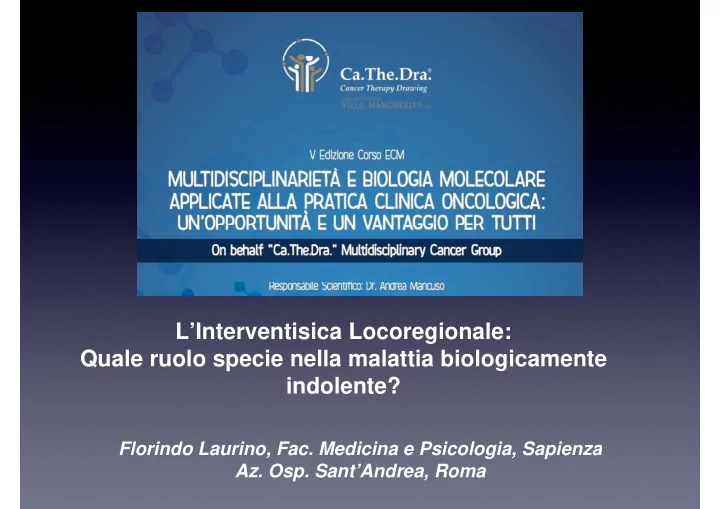

L’Interventisica Locoregionale: L Interventisica Locoregionale: Quale ruolo specie nella malattia biologicamente indolente? Florindo Laurino Fac Medicina e Psicologia Sapienza Florindo Laurino, Fac. Medicina e Psicologia, Sapienza Az. Osp. Sant’Andrea, Roma
Metastatic Colorectal Cancer: Metastatic Colorectal Cancer: the magnitude of the problem in Europe Colorectal Cancer: 450.000 per year (the second most frequent cancer cancer • 200.000 deaths/y about • The CRC-related 5-year survival : 60% • the m-CRC -related 5-year survival: only 6% Metastases Occurence: • 75% of pts will have metastasis (25% at diagnosis,50% during the desese) • more than 330.000 of mRCR new cases per year th 330 000 f RCR Liver Metastases: • 85% of metastases are located in the liver
Indolent Disease Indolent Disease
Multidisciplinary Team y
Oncologic Oncologic g IR IR
Radiofrequency Radiofrequency • Tumoral tissue heating (60° - 100° C) ( ) • Cell death (thermocoagulation necrosis) (thermocoagulation necrosis) Molecules ionic collision Heat production Heat production (coagulative necrosis)
Microwaves Microwaves • Tumoral tissue heating Tumoral tissue heating (65° - 150° C) • Cell death C ll d th (thermocoagulation necrosis) No corrent flow through the patient
Cryoablation Cryoablation
Electroporation ti t El
HAI (Hepatic Arterial I f Infusion) i ) • Transfemoral access Transfemoral access • Angiography • GDA obstructed • Catheter placed into C th t l d i t common hepatic artery
TACE / TAE TACE / TAE • High selective • Less Data
SIRT SIRT (Selective Internal ( Radiation Therapy) 90 90 Y • • glass spheres • resin spheres resin spheres
Li Liver Metastases M t t Liver is usually the firs site of metastases • Hematogenic spread: portal vein -> liver -> lung -> other organs (1541 CRC necropsies *) ( p ) Vascolarization: Vascolarization: CRLM: almost exclusively by hepatic artery (e.p. if > 3cm) • N Normal liver: preferentially by portal vein l li f ti ll b t l i • *Weiss L et al., J Pathol 1986, 150:195-203
New terapies have determined an increase of OS of pts with non resectable CRC LM p
Minimally Invasive Therapy RF TACE MWA MWA HIFU HIFU TAE SIRT HAI HAI
TACE TACE Rationale • Irinotecan is a major drug for the treatment of • Irinotecan is a major drug for the treatment of metastatic colorectal cancer • Anti - angiogenetic agents have shown an efficacy in the systemic treatment of mCRC the systemic treatment of mCRC • Increase of local concentration of drug has always given a benefit when compared with IV administration
Dc Beads it is possible to load chemotherapy Dc Beads, it is possible to load chemotherapy into the Beads
It li Italian Phase III Ph III • Primary objective: increase 2-yr OS by 40% P i bj ti i 2 OS b 40% Fiorenitini G, et al. Anticancer Research 2012;32:1387-96
Fiorenitini G, et al. Anticancer Research 2012;32:1387-96 TACE TACE
DEBIRI: a high level of evidence, a need for standardization
Single metastasis Embolization
May 2014 pre y p September 2014 post September 2014 post
Post Pre
Ablation Therapy Indications • 3 or less liver lesions (< 3cm) • 3 or less liver lesions (< 3cm) • Poor response to CT Poor response to CT • Residual cancer after CT • Pts unsuitable for resection • Associated to resection
Ablation Therapy Negative Prognostic Factors • 4 or more liver lesions • Diameter of the lesion > 5cm f • Safety halo < 1cm Safety halo < 1cm • High levels of CEA
Ablation Therapy
Lung Metastases B Background k d Most cited primary malignancy: colorectal cncer Most cited primary malignancy: colorectal cncer Main Actor: clinical oncologist
Background Background • 5-years survival between y • 17 studies, 1684 patients 41% and 56% (median 48%) • Mortality rate less than 2,5% • Single metastasis: better Mortality rate less than 2 5% outcome
Best Candidate: Surgery Best Candidate: Surgery • Prolonged disease free internal between primary and metastases • Normal CEA N l CEA • No nodal involvement • Single metastases
New Trend: Surgery New Trend: Surgery
The beginning The beginning 4 patients with 5 metastases • Not suitable for surgery (comorbidity, refusal, etc.) •
Ablation: the first Ablation: the first prospective study prospective study • Multi-centric, single arm, prospective trial • 73 metastatic patients • Patient selection: unsuitable for surgery SBRT and CT • Patient selection: unsuitable for surgery, SBRT and CT • Overall survival: 66% and 64% at 2 years for CRM and other metastases respectively
Need for comparative trials Need for comparative trials
Ablation: Ablation: today • Overall survival rate 51% at 5-years as per the major surgical series • 24% of retreatments up to 4 times with no change in respiratory function respiratory function More than surgery g y
S So what to do? h t t d ? • > 50 pts, > 24 months follow up • 27 studies: 4 RFA, 23 surgery (no SRBT eligible) Conclusion Conclusion • Lack of phase III trials ac o p ase a s • Surgery: largest series and longer follow up
Trials Ongoing Trials Ongoing No comparative or randomised trials at the moment No comparative or randomised trials at the moment Ethical implications? Ethical implications? Long lasting recruiting time? Population dimension?
C Conclusion l i Ablation Therapy Embolization • Effective in second line • Minimally invasive and further and further • Rapid execution Rapid execution • First line? • Low rate of complications, morbidity and mortality bidi d li • + systemic CTx? • Low cost (Day Hospital) • Waiting for SIRT trials in g progress • High rate of effectiveness • First choice in lung • First choice in lung metastases?
Grazie Grazie
Recommend
More recommend